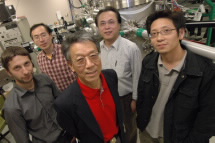Oct 1 2007
The independent Good Universities Guide earlier this year awarded the University of Wollongong a maximum five-stars for ‘research intensivity’ and that finding has now been reinforced with the Federal Government announcing $14.7 million in Australian Research Council (ARC) Discovery Grants and Linkage Grants.
 A stand out in the ARC grant recipients list was the ISEM which received $4 million. ISEM Director Professor Shi Dou (centre front) is pictured with some of his research team (from left) Dr Germanas Peleckis, Dr Sihai Zhou, Professor Chao Zhang and Dr Jung Ho Kim
A stand out in the ARC grant recipients list was the ISEM which received $4 million. ISEM Director Professor Shi Dou (centre front) is pictured with some of his research team (from left) Dr Germanas Peleckis, Dr Sihai Zhou, Professor Chao Zhang and Dr Jung Ho Kim
Under the ARC Discovery Projects Scheme UOW achieved 32 grants totalling $11.3 million.
One of the research areas which received significant funding was in Future Materials. The Institute for Superconducting and Electronic Materials (ISEM) received $4 million in funding for seven Discovery Projects.
Energy is a critical factor affecting worldwide prosperity. The current science base cannot meet the high demands for energy in light of the likely depletion of natural energy sources and the increase in the world population.
To meet this challenge, ISEM focuses on the establishment of interdisciplinary research programs on energy materials and technology, including energy generation, conversion, efficiency, transmission, storage and conservation.
And also in the area of Future Materials, the Intelligent Polymer Research Institute (IPRI), received more than $1.1 million in ARC funding and an additional grant with Engineering’s Professor Elena Pereloma to purchase a significant piece of equipment (a scanning electron microscope, valued at $600,000) which will ensure that UOW remains a leader in the field of nanomaterials.
The Discovery grants included a number of research fellowships. ISEM received three fellowships – Dr Alexey Pan (Australian Research Fellowship); and Dr Jung Ho Kim and Dr Xuebin Yu (Australian Postdoctoral Fellowships). Members of the School of Earth and Environmental Sciences’ new archaeological science team working on projects in Africa, Arabia and Asia, have also been rewarded with fellowships -- Professor Bert Roberts was awarded an Australian Professorial Fellowship; and Dr Lee Arnold and Mr Adam Brumm awarded Australian Postdoctoral Fellowships.
Their work complements existing research being carried out by the team involved in the discovery of the new human species nicknamed the ‘hobbit’.
“It’s an extremely good result for the University and clearly shows that our academics are at the forefront of research activity in this country,” the Acting Deputy Vice-Chancellor (Research), Professor Lee Astheimer said.
And she pointed out that the 32 funded Discovery Grants were well spread across UOW’s faculty-based research sector.
A pleasing aspect of this year’s outcomes was the awarding of grants to researchers in the humanities and social, economic and behavioural sciences as well as the outstanding results achieved by the University’s ongoing research strengths, Professor Astheimer said.
Professor Astheimer highlighted the successful outcome for the Faculty of Commerce’s Associate Dean of Research, Professor Sara Dolnicar who received two Discovery Projects and one Linkage International, hot on the heels of her recent success of two Linkage Projects in a previous round.
And she said that one of UOW’s newest research strengths, the Centre for Statistical Survey and Methodology (CSSM) received two Discovery Grants through Professor Ray Chambers and Professor Matt Wand.